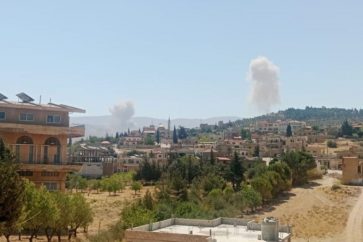Lebanese depositors took to streets in the capital on Friday as employees of its state-run telecoms company Ogero began an open-ended strike to demand pay increases reflecting the drastic low of the national currency.
The “Depositors’ Cry” association carried out a sit-in in front of the Lebanese Central Bank in Hamra in rejection against the “unjust circulars to depositors.”
مودعون يحرقون إطارات السيارات خلال مظاهرة أمام مصرف لبنان، اليوم الجمعة، اعتصاما أمام مبنى المصرف المركزي في بيروت.
وبلغ الاعتصام ذروته في قطع الطريق بالإطارات المشتعلة وإطلاق المفرقعات النارية باتجاه المصرف، بالإضافة إلى محاولة اقتحام أحد المصارف المجاورة. pic.twitter.com/drXQv0onoX
— الوفاق نيوز (@alwfaqnews) March 24, 2023
Meanwhile, depositors also protested near branches of Bank of Beirut and the Arab Countries (BBAC) and Al-Mawared Bank in Hamra, and are trying to destroy the fortified facades of both banks which are currently closed.
Lebanese Army soldiers and anti-riot squad were deployed to the area, National News Agency (NNA) reported.
Ogero Strike
Meanwhile on Friday, Lebanon faces internet blackout threats as employees Ogero began an open-ended strike.
Imad Kreidieh, Ogero’s chairman, warned of “catastrophe” if a deal is not found with the government.

In an interview with The National, Kreidieh said: “The network will completely stop working as our generators will gradually run out of fuel.”
He warned that Alfa and Touch, Lebanon’s telephone operators, will also be affected.
“Lebanon completely relies on Ogero for its bandwidth, leaving no one exempt from a blackout,” Ogero chairman added.
IMF Warns
Earlier on Thursday, the International Monetary Fund (IMF) warned that Lebanon was in a very dangerous situation a year after it committed to reforms it has failed to implement and said the government must stop borrowing from the central bank.
IMF mission chief Ernesto Rigo told a news conference in Beirut that the authorities should accelerate the implementation of conditions set for a $3 billion bailout.

“One would have expected more in terms of implementation and approval of legislation” related to reforms, he said, noting “very slow” progress. “Lebanon is in a very dangerous situation,” he added, in unusually frank remarks.
Lebanon’s national currency has hit a record low, with 106,000 Lebanese pounds now worth only $1, compared with $67 before an economic crisis that began in 2019.
Most people’s salaries have failed to keep up with the cost of living, with inflation estimated at more than 180 per cent last month.
Source: Lebanese media




